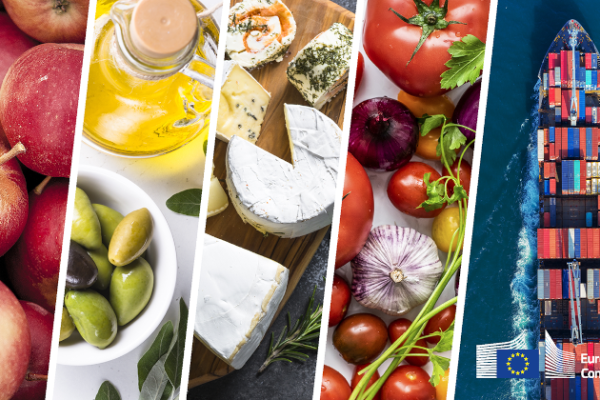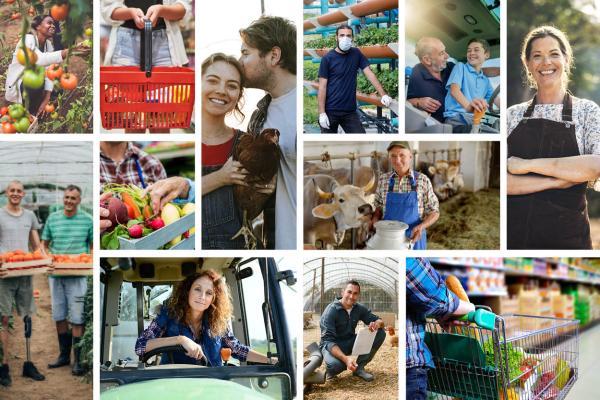Agri-food trade with ENP East
The European Neighbourhood Policy (ENP) governs the EU’s relations with sixteen of the EU’s closest Eastern and Southern neighbours.
ENP countries are grouped into eastern and southern regions. To the east are Armenia, Azerbaijan, Belarus, Georgia, Moldova and Ukraine. Russia takes part in cross-border cooperation activities under the ENP but is not part of the ENP as such.
Overall the EU is a net exporter to these countries (except Ukraine and Moldova) and exports a diversified range of products (pet food, liquors, cheese, oilseeds, sugar etc). In the other direction, the EU mainly imports cereals, vegetable oils, (Ukraine, Moldova) fruit (Moldova, Georgia, Azerbaijan), liquors (Armenia).
Agreements with Eastern ENP countries
Eastern ENP countries are subject to either Association Agreements (AA) or to Partnership and Cooperation Agreements (PCA).
Association Agreements
Georgia, Moldova, Ukraine are subject to Association Agreements (AA). The AAs contain a trade dimension and also provide a framework to facilitate the further approximation and convergence of the six countries with EU standards, notably in the case of Ukraine with several pieces of CAP and SPS legislation.
The AAs, including Deep and Comprehensive Free Trade Areas (DCFTAs), have been signed on 27 June 2014 with Georgia, Moldova and Ukraine and are now all in force. The three agreements contain high level protection of Geographical Indications (GIs), whereby the full list of EU GIs is protected in these countries.
Partnership and Cooperation Agreements
Armenia and Azerbaijan are subject to Partnership and Cooperation Agreements (PCA). The EU has not ratified the PCA concluded with Belarus in 1995 in the absence of Belarus’ commitment to democracy, political and civil rights.
Countries
Armenia
Bilateral relations are governed by the Comprehensive and Enhanced Partnership Agreement (CEPA), provisionally applied since June 2018. The agreement is non-preferential (i.e. no tariff concessions) but both Parties ensure recognition and protection of the entire list of Geographical Indications protected on their respective territory.
With Armenia, the EU signed a "Comprehensive and Enhanced Partnership Agreement" (CEPA) on 24 November 2017 with no market access dimension. However, the agreement foresees mutual protection of GIs, and the challenging phasing-out of the Cognac and Champagne names by Armenia.
The European Union is a net exporter of agri-food products to Armenia. Main EU exported products are pet food, confectionary and live plants. Imports of Armenian agri-food products consist by far of spirits (brandy) , more than a half, followed by wine, cigars and cigarettes.
Related information
Partnership and cooperation agreement
Azerbaijan
EU-Azerbaijan trade relations are based on a Partnership and Cooperation Agreement (PCA), which has been in force since 1999. The EU and Azerbaijan launched negotiations for a new comprehensive agreement in 2017, which are at an advanced stage. The agreement will contain a chapter on Geographical Indications providing for the mutual recognition and protection of Geographical Indications of both Parties.
In 2017 the EU started negotiations with Azerbaijan on a revised Partnership and Cooperation Agreement (the current one dates back to 1999), which will not encompass a market access dimension but will include a GI chapter.
EU is a net exporter of agri-food products to the EU. Azerbaijan exports almost exclusively nuts (more than 90%) while the main EU exports are food preparations, cheese and spirits.
Related information
Partnership and cooperation agreement
Belarus
The bilateral trade and economic relations are not governed by a recent agreement but remain covered by the Trade and Cooperation Agreement concluded by the European Community with the Soviet Union in 1989 and subsequently endorsed by Belarus. There is also a biannual meeting in the EU-Belarus Coordination Group and a EU-Belarus Trade Dialogue.
The European Union is a net exporter of agri-food products to Belarus. Main EU exported products are fruit and vegetables, live plants and pet food. Imports of Belarus agri-food products mainly concern vegetable oils, vegetables (mushrooms) and fruit (berries).
Related information
Georgia
The EU-Georgia bilateral relations for agricultural products are governed by the Association Agreement, including a Deep and Comprehensive Free Trade Area, signed on 27 June 2014, fully in force since 1 July 2016. It provides for a fully liberalised market access for EU agri-food products to the Georgian market and for Georgia's exports to the EU, with the exception of garlic.
The European Union is a net exporter of agri-food products to Georgia. Main EU exported products are spirits, sugar and food preparations. Imports of Georgian agri-food products mainly concern spirits, hazelnuts and wine.
Under the Association Agreement, both Parties ensure recognition and protection of the entire list of Geographical Indications protected on their respective territory.
Related information
Moldova
The EU-Moldova bilateral relations are governed by the bilateral Association Agreement including a Deep and Comprehensive Free Trade Area, signed on 27 June 2014, fully in force since 1 July 2016. Moldova has liberalised access to the market at the entry into force, with some tariffs to be dismantled within transition periods. Certain tariff rate quotas (TRQs) have been granted for the most sensitive products (pigmeat, poultry, dairy products, processed meat products, sugar and sweeteners). On the other hand the EU granted market access for Moldova's agricultural exports from the date of the entry into force of the agreement, with the exception of 6 fruit and vegetables products, which are covered by the TRQs exempted from the entry price (both ad valorem and specific components): garlic, tomatoes, fresh table grapes, fresh apples, fresh plums, grape juice. Other fruits and vegetables that are subject to the entry price system are exempted from the ad valorem component.
Moldova is a net exporter of agri-food products to the EU, main categories being oilseeds, cereals and vegetable oils. Main EU exported products are oilseeds, pet food, spirits and pigmeat.
Under the Association Agreement, both Parties ensure recognition and protection to the entire list of Geographical Indications protected on their respective territory..
Related information
Ukraine
The EU-Ukraine bilateral trade in agricultural products is regulated by the Association Agreement (AA), that entered into force on 1 September 2017 (its political and cooperation provisions have been provisionally applied since November 2014). The AA includes a Deep and Comprehensive Free Trade Area (DCFTA), the economic part of the agreement, signed on 27 June 2014 and fully in force since 1 July 2016. The AA with Ukraine goes further than other classic free trade agreements, as it aims both to open up markets but also to address competitiveness issues and lists the steps needed for meeting EU standards and being able to trade in EU markets. The DCFTA is a far reaching agreement under which Ukraine commits to align itself to relevant EU "acquis" in all of the chapters, including in the area of sanitary and phytosanitary standards and animal welfare.
Ukraine is EU’s 4th largest source of agri-food imports and 15th export market (2019). EU mainly exports to Ukraine cigars and cigarettes, oilseeds and pet food. The main imported products groups from Ukraine are cereals (mainly maize), vegetable oils and oilseeds. Ukraine is EU's largest source of maize imports.
Related information
Russia
Relations between the EU and Russia are regulated by the 1994 Partnership and Cooperation Agreement (PCA), entered into force in 1997. The negotiations for the renewal of the PCA (the so-called "New Agreement") launched in 2009 are currently stalled for political reasons.
On 7 August 2014, Russia introduced a political ban on imports of a range of EU agricultural products, as a retaliation to sanctions taken by the EU after the annexation of Crimea. The ban still applies. However Russia is still the seventh largest market for EU agri-food exports (2019), which mainly consist of wine and spirits, confectionary and pet food. EU mainly imports oilcakes, oilseeds and vegetable oils.


